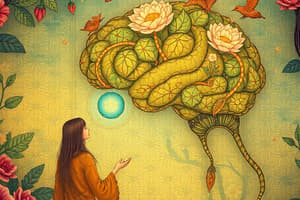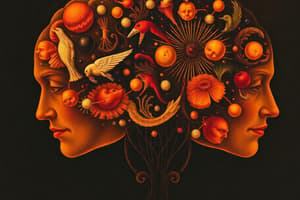Podcast
Questions and Answers
Which type of intelligence involves the ability to think conceptually and discern logical patterns?
Which type of intelligence involves the ability to think conceptually and discern logical patterns?
- Logical – Mathematical Intelligence (correct)
- Verbal – Linguistic Intelligence
- Spatial – Visual Intelligence
- Bodily – Kinesthetic Intelligence
Howard Gardner theorized that individuals may possess multiple types of intelligences. Which of the following is NOT one of his identified intelligences?
Howard Gardner theorized that individuals may possess multiple types of intelligences. Which of the following is NOT one of his identified intelligences?
- Spatial – Visual Intelligence
- Interpersonal Intelligence
- Verbal – Linguistic Intelligence
- Cultural Intelligence (correct)
What is the primary focus of componential intelligence according to Robert Sternberg?
What is the primary focus of componential intelligence according to Robert Sternberg?
- Mental components involved in analyzing (correct)
- Creative problem-solving skills
- Ability to deal with immediate environments
- Knowledge acquired through education
Which type of intelligence specifically emphasizes highly developed verbal skills, including sounds and meanings of words?
Which type of intelligence specifically emphasizes highly developed verbal skills, including sounds and meanings of words?
Which concept by Charles Spearman about intelligence involves a singular problem-solving factor?
Which concept by Charles Spearman about intelligence involves a singular problem-solving factor?
What is one essential definition of intelligence according to the module?
What is one essential definition of intelligence according to the module?
Why do some philosophers argue that intelligence cannot be absolutely measured?
Why do some philosophers argue that intelligence cannot be absolutely measured?
Which of the following concepts is NOT mentioned as part of intellectual development in the module?
Which of the following concepts is NOT mentioned as part of intellectual development in the module?
What aspect of intelligence emphasizes a person's ability to apply knowledge to manipulate their environment?
What aspect of intelligence emphasizes a person's ability to apply knowledge to manipulate their environment?
According to the module, how should one approach the development of study habits?
According to the module, how should one approach the development of study habits?
Flashcards are hidden until you start studying
Study Notes
Conceptualizations of Intelligence
- Charles Spearman proposed intelligence as a single factor for problem-solving, influencing performance across various areas.
- Louis Thurstone identified seven primary abilities that constitute intelligence, including verbal and numerical skills.
- Raymond Cattell categorized intelligence into crystallized (knowledge and skills) and fluid (reasoning and problem-solving) types.
- Robert Sternberg's triarchic theory defines intelligence through three components: componential (analytical), experimental (creative), and contextual (practical).
Multiple Intelligences
- Howard Gardner introduced the theory of multiple intelligences, asserting individuals possess various types of skills that can influence their self-concept and esteem.
- Verbal Linguistic Intelligence: Involves skillful use of words, sounds, and meanings.
- Logical Mathematical Intelligence: Represents the ability to conceptualize, think abstractly, and discern numerical patterns.
- Spatial Visual Intelligence: Involves thinking in images and visualizing spatial relationships accurately.
- Bodily Kinesthetic Intelligence: Relates to the ability to control bodily movements and handle physical tasks.
- Musical Intelligence: Reflects one’s capacity to appreciate and produce rhythm, pitch, and timbre.
- Interpersonal Intelligence: Ability to understand and respond to the emotions and motivations of others.
- Intrapersonal Intelligence: Awareness of one’s own inner feelings and values.
- Naturalist Intelligence: Knowledge of the environment and ecological systems necessary for survival.
- Existential Intelligence: Capacity to ponder deep questions regarding life and existence.
Nature of Intelligence
- Intelligence is not easily quantified and can vary based on cultural and temporal contexts.
- According to Albert Einstein, true intelligence encompasses imagination rather than just knowledge.
Intellectual Development
- Development of intelligence involves motivation to learn, unlearn outdated concepts, and re-learn relevant information.
- Effective study habits are crucial for achieving educational and personal goals, enabling better learning outcomes.
Study Habits
- Study habits include consistent actions like reading, note-taking, and participating in study groups.
- These habits can significantly enhance learning efficiency and overall student performance.
Intended Learning Outcomes
- Understand the essence of intelligence and its various forms.
- Develop effective study habits tailored to individual learning styles.
- Acquire time management and decision-making skills that apply to academic and personal contexts.
Studying That Suits You
Use AI to generate personalized quizzes and flashcards to suit your learning preferences.




